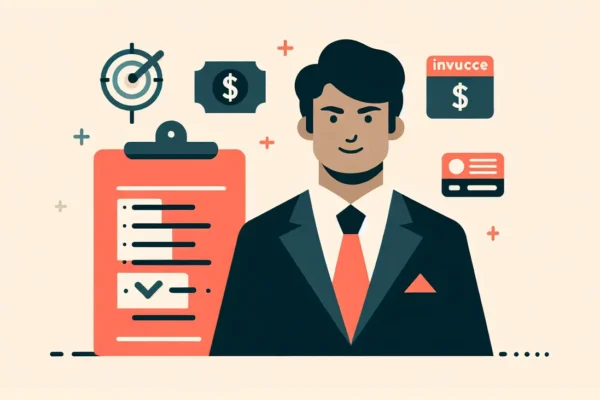Navigating the world of business finance can be tricky, especially when it comes to recovering debts. Understanding why business debt recovery is crucial for your growth can empower you to make better financial decisions, ensuring your business stays on the path to success.
Understanding Business Debt Recovery
Business debt recovery involves the processes and strategies used to secure overdue payments from clients or customers. It plays a pivotal role in maintaining your cash flow and ensuring financial stability.
At its core, business debt recovery is about ensuring that money owed to your company makes its way back to you in a timely manner. This often involves a series of steps that can range from sending gentle reminders to your clients, negotiating new payment terms, and, if necessary, escalating the situation to involve professional collectors or legal proceedings. The goal is to minimize the amount of time and resources tied up in unpaid invoices, freeing up capital that can be used for reinvestment, growth, and ensuring your business’s long-term success.
It’s important to understand that a dedicated approach to debt recovery doesn’t just support current operations; it also strengthens your business’s credit profile. This is crucial when looking to secure loans or investments in the future. A strong cash flow and good debt recovery track record demonstrate to potential investors and financial institutions that your business is able to effectively manage its finances, making it a more attractive proposition for future partnerships.
The Impact of Debt on Business Growth
Unresolved debts can severely impact a business’s ability to grow. With limited cash flow, you may struggle to invest in new opportunities, hire additional staff, or expand your product line.
When debts remain unpaid, they create a ripple effect that can touch nearly every part of your business operations. Consider the implications: limited cash flow can mean delaying critical investments in technology that could give you a competitive edge. Perhaps it prevents you from opening that second location or taking on a promising new project. The money tied up in unpaid invoices represents potential that is, quite literally, in someone else’s hands.
In addition to stalling growth, unresolved debts can also result in missed opportunities. You might find yourself unable to take advantage of market trends or pivot quickly when a new demand arises, simply because the resources you need are locked away. Moreover, the stress of financial uncertainty can impact decision-making in your business, leading to cautious moves that stifle innovation.
Optimizing Your Debt Recovery Process
An efficient debt recovery process involves setting clear payment terms, regularly monitoring outstanding invoices, and utilizing technology for automated reminders. These steps can significantly reduce the time and resources spent on tracking down payments.
To optimize your debt recovery, begin by establishing well-defined payment terms right from the start of any business relationship. These terms should be simple but comprehensive, covering all aspects of payment, like due dates, penalties for late payments, and steps that will be taken in case of non-payment. Transparency from day one helps in setting clear expectations and paves the way for smoother transactions.
Moreover, leveraging technology can be a game changer in your debt recovery efforts. Automation tools designed for financial management can help keep track of outstanding invoices, send regular reminders to clients, and flag accounts that are overdue. This systematized approach ensures that debts are not overlooked or forgotten, and it becomes easier to follow up promptly, which can be critical in maintaining a healthy cash flow.
Finally, regularly reviewing your debt recovery process allows you to proactively identify bottlenecks or inefficiencies. By analyzing trends and spotting recurring issues, you can refine your approach, setting more attainable goals or readjusting your strategies as needed.
The Role of Communication in Debt Recovery
Effective communication is essential in the debt recovery process. Maintaining open channels with clients ensures they are aware of their obligations and the impact of late payments on your business.
Clear communication from the outset about payment terms and expectations is crucial. Regularly engaging with your clients about their accounts helps reinforce payment schedules and demonstrates your proactive approach in managing finances. Furthermore, being approachable yet firm when discussing overdue payments can foster both respect and understanding between you and your clients, ultimately leading to a better resolution.
In cases where clients are facing genuine difficulties, empathetic communication can pave the way for negotiated solutions that benefit both parties. Offering alternatives such as payment plans can show clients that you value their business relationship and are willing to work towards a mutual resolution. Maintaining professionalism and empathy throughout these discussions can preserve your client relationships, even when money is tight.
Partnering with Professional Debt Recovery Services
For many businesses, partnering with professional debt recovery services can provide an efficient way to manage outstanding debts. These services have the expertise and resources to handle difficult cases and improve collection rates.
Engaging with professionals who specialize in debt recovery can relieve your business from the complexities involved in the collection process. These experts bring with them a wealth of experience, utilizing advanced techniques and legal knowledge that can significantly enhance the efficiency and success rate of recovering debts.
By partnering with a professional service, you can also protect your relationship with your clients. Having a third party handle debt recovery allows you to maintain your business’s focus on core operations. Moreover, their objective approach might be more effective and less emotionally charged, thus preserving goodwill and ongoing business with the client.
Ultimately, delegating debt recovery can be a cost-effective measure, particularly for businesses dealing with significant volumes of accounts. The return on investment can be substantial, as professional services often recover debts that you might otherwise deem lost, contributing to continuous business growth.
Harness the Power of Debt Recovery for Sustained Success
Incorporating effective debt recovery strategies into your business plan not only stabilizes your finances but also fosters an environment for sustained growth. By staying proactive in managing debts, you create a more robust business model, one that is resilient enough to weather financial challenges and poised to seize new opportunities.







